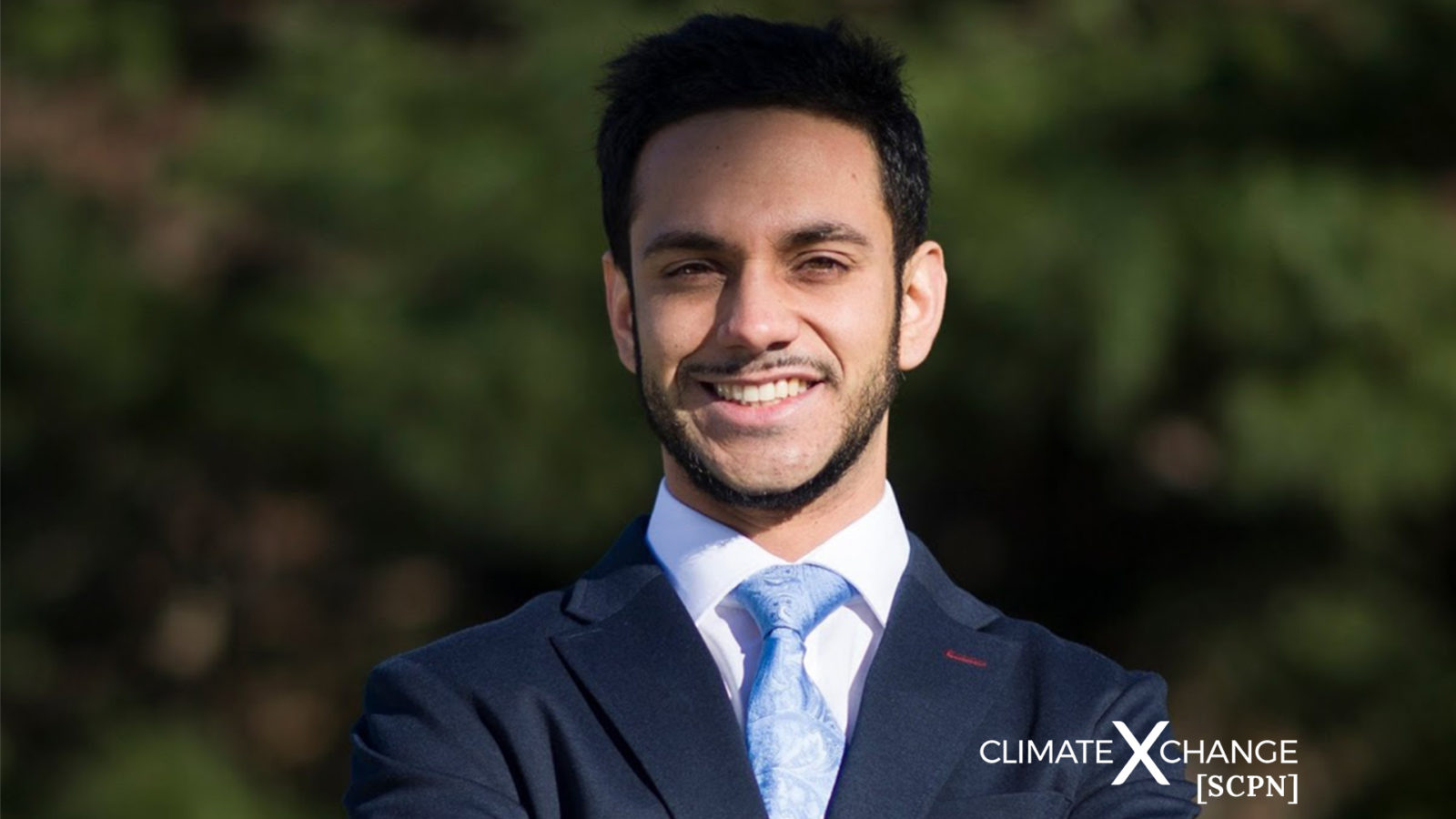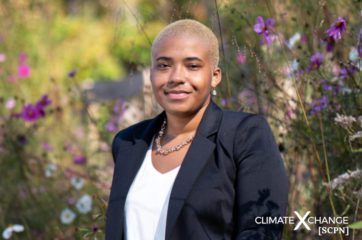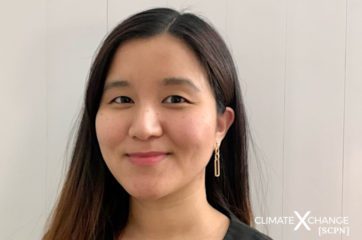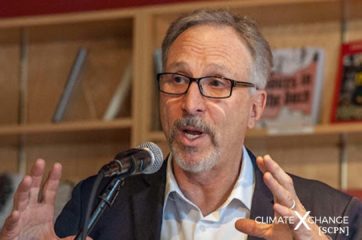All across the country, members of our State Climate Policy Network (SCPN) are fighting to make an impact on climate change in their communities. We have individuals in our Network from all 50 states, each experiencing climate change differently in their local areas and finding unique solutions to build resiliency efforts.
Elected as Virginia’s youngest state legislator, Delegate Ibraheem Samirah has built his career around standing up for his community in the face of large corporate interests. Before joining the Virginia legislature, Samirah attended Boston University’s dental school and today runs a community-based dental clinic in the metro-D.C. area in addition to his role as an elected official.
Ava Gallo
Thank you so much for joining me today! Let’s start with going into your story.
Del. Samirah
Sure! I grew up in Chicago. I had a very typical American childhood. At the age of 11, my father traveled abroad and on his return he was told that he was not allowed re-entry into the United States. This triggered a series of lawsuits, but also displaced my family to Jordan, which is where I graduated from high school. I worked really hard, got good grades, and eventually got a full scholarship to American University. So I came back and landed in D.C. Four years later, I graduated with a Political Science degree.
After graduating, I went to dental school in Boston and then came back down to Northern Virginia. It was always my plan to give back. I had been involved a lot in the Northern Virginia community, and it felt like home.
I then ran for office with no expectation of winning, and was completely surprised by my victory. Ever since then, I have been the youngest elected official in the Virginia legislature, and I am still holding on to that privilege.
Ava Gallo
Can you elaborate more on the transition from going to dentistry school and then becoming a public servant?
Del. Samirah
It was a natural fit for me, because I was always ingrained in politics with my father’s denial of re-entry into the U.S. That was very political. He was a civil rights activist for Muslim Americans and Arab Americans in the Chicago area. He was a big target after 9/11, and so he was not allowed to grow his stature and the stature of the communities he represented. There was a very personal targeting due to politics.
Ever since then, I committed myself to fighting injustice in as many ways as I can, but using my own personal experiences to guide the way as a Palestinian-American. We just passed the 10 year anniversary of the Arab Spring. We are in the middle of so many anti-democratic situations in the United States built up through the years.
At American University, I was engaged in all sorts of student government work and clubs. I even started a chapter of Jewish Voice for Peace to fight the issues of the Israeli-Palestinian conflict even though I’m not Jewish.
At dental school, I took it to the next level, and I started engaging in a lot of local work in Cambridge and Boston. There’s a really rich activist space over at Boston University including divesting from fossil fuels campaigns. AOC had graduated about 2 years before I got there to give you context of the time frame.
From there I got involved with electoral activism by way of protesting Bernie Sanders as one of the first moves that I made. It was legitimate, and he apologized. But that was my first foray as a 23-year old protesting Bernie Sanders who no one knew anything about at the time. I then helped out Rashida Tlaib in her primary before she was known.
Those were all formative experiences for me to eventually run for office myself.
Ava Gallo
Piggybacking off your story of protesting Bernie Sanders, I wanted to touch upon your now infamous protest against Trump and your bucking of the “Virginia Way” system.
Del. Samirah
Certainly! I tell my colleagues all the time, but we are in a one party system in Virginia, because of this “Virginia Way.” What I mean by that is most of the time corporate interests rise above human interest. It’s very normal for that to happen, and that is the environment that I arrived in when I was elected. I was coming in not owing anything to anyone. I had the support of my community, but I didn’t have the support of any interest groups or big stakeholder groups in Virginia.
When I got to the legislature, I noticed that everything is closely watched, not by my colleagues but by “the powers that be.” I learned that I was not going to be accepted into the system of government unless I stood up for myself and the things that I believed in. Until that happened, I was going to continue to be bullied by corporate interests. I wanted to set myself free.
There was contemplation whether or not Donald Trump should be accepted in the 400th anniversary celebration of Virginia’s statehood, a monumental moment in Virginia history, celebrating 400 years of representative democracy. You want to allow a white supremacist to represent your democracy on that day? What happened to separation of federal and state power? What happened to protecting the interests of Virginians?
That’s where I drew the line. The “Virginia Way” was really messing things up and allowing our system to become more authoritarian. At the time, Trump was attacking Congressman John Lewis and “the Squad” saying that they should “go back home.” And he wanted to come and do a “proper democracy” speech? It made no sense to me.
When the decision came, I was going to make sure that I imprinted this moment in history. The youngest legislator in the Virginia legislature was not accepting of this form of representation of our democracy. I obviously received a lot of criticism because of my way of protesting, but he was putting on a display and so should the people be allowed to put on a display. I felt that I was a vehicle for the people. The regular people were very proud. I say to this day, Trump’s approval rating was the lowest it could be the week after I did that protest. I think that was a statement to the rest of my colleagues, that if you don’t stand up to the bully, you are going to have a lot of trouble staying in power. I hope to continue that.
Ava Gallo
I think that you’re right in that there is this growing majority of people who are tired of this notion of “civility” and “unity.” We are also seeing this on the federal level. There is this want for progressive legislation, but a cohort of congressional people who are unwilling to buck the system on the federal level. Do you see this parallel of the “Virginia Way” to the federal level?
Del. Samirah
At the federal level there is a lot more attention on each action. In the coming days, weeks, and months we are going to be seeing a lot of ways of dealing with insufficient pieces of legislation. The biggest strategy that is at play is demonstrating the negative impacts of not implementing a policy to a systemic problem.
For example, in Virginia, a bill that passed was the Virginia Clean Economy Act, which was insufficient. It allows for nuclear and carbon capture. I opposed it heavily, but I ended up voting for it, because it is a step forward. Soon after, we discovered that it increases rates on payers significantly. We basically just authorized the energy companies to make $250 more per household per year through this bill.
That’s not how this bill was supposed to work at all. It was supposed to make electricity bills cheaper, because the sun and wind are free. This is to say that half solutions are problematic, and they usually show themselves as such eventually. If the federal government wants to go down the route of partial solutions, progressives like me are ready to immediately respond with the proper solutions and expose the ineffectiveness of the proposed policy.
Ava Gallo
On that thread, can you go into more detail about a bill you recently championed that would ban political contributions from public service corporations, and why that is so important specifically in Virginia?
Del. Samirah
Public service corporations include energy and electricity companies but also broadband and telecommunications companies. These are all public goods that people need in Virginia in order to live their lives. I sought to blanket ban their ability to contribute, because telecommunication companies donate about $8 million each year and the energy space spends $12+ million each year in Virginia. That’s an absurd number for state elected officials. What that does is increase elected officials’ reliance on these entities, allowing them to have control over the officials that are supposed to be regulating their profits.
We, the regulators, dictate how much profit the public service corporations are allowed to make. They have dumped so much money into our campaign accounts. I shouldn’t say “our.” THEIR campaign accounts, the people who take money from these corporations, which makes their decision making process flawed.
By eroding our democracy through these excessive campaign contributions, we are also eroding our environment and contributing to carbon pollution. The more that we allow this type of practice to continue, the less our legislature is accountable to the people who need environmental justice solutions, the harder it becomes to transform our economy to revolve around clean energy, the more people in rural areas lose their jobs, and the closer we get to catastrophe. This all has to be handled.
At the core of this, is the “Virginia Way” of allowing unlimited campaign contributions to come in. Virginia is one of very few states where there is no limit on campaign contributions. It’s both parties that play along with this. Money is money to both sides.
Ava Gallo
So as you are moving forward in your legislative career, what would be your long term vision for Virginia in the climate space?
Del. Samirah
A fossil fuel moratorium immediately. I think we can absolutely transition to decentralized energy creation through solar creation on people’s homes. We have a lot of sun in Virginia. I know my house has a 92% rating for sunlight, and I don’t think it gets much better than that. I think that I could definitely use a few solar panels, but I’m not allowed to right now.
We need to be able to provide jobs that are of equivalent economic value to the fossil fuel sector. Every single person that loses a job needs to have another career available to them or their children in the long run. We can’t keep allowing industrial cities to exist without any people living in them. We need to be able to transition and not leave anyone behind.
We need to focus on people who are struggling as a result of all environmental burdens in Virginia: low-income, Black, indigenous, people of color, people all across the board need to have that opportunity.
Ava Gallo
Absolutely! I like to end by looking forward. What keeps you inspired to keep fighting climate change and fighting for progressive policies year after year?
Del. Samirah
I think the fact that there are so many avenues to pursue it. There are so many overlaps to solve different issues together. I didn’t even talk about affordable housing today and how big of a problem that is. That’s another example! If you can tie something to the environment, that is a wonderful vehicle to pursue justice. That is the ultimate thing for me. I go back to that personal story of mine. I faced so much injustice growing up, and if there is a vehicle that advances justice so effectively, that’s an exciting pathway forward.
I was just listening to President Biden talking about how he wants to pursue affordable housing infrastructure as a pathway to saving our planet. Just seeing how that idea has risen to the presidency, that is so exciting, because at the end of the day, just by virtue of talking about affordable housing through the lens of the environment, it’s pushing back against these fossil fuel corporations who are a big part of the corruption of our democracy.
Ava Gallo
It’s definitely an exciting time to be in the climate space. We’re finally having some wins, which feels good and different.
Thank you so much for your time today! I am excited to bring your story to our network.









